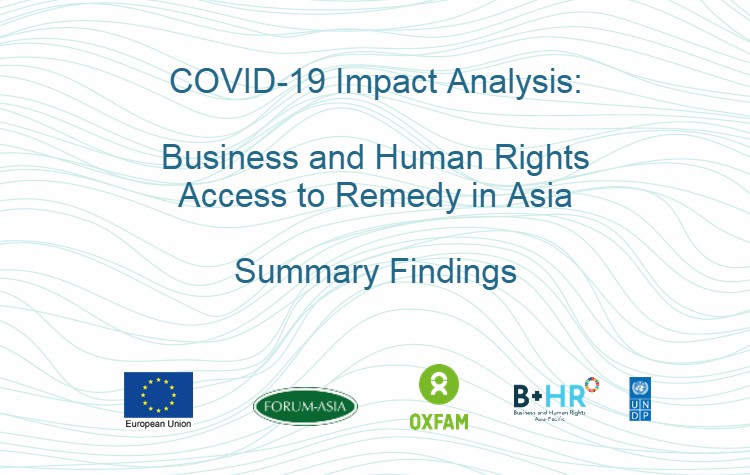“COVID-19 has changed everything,” says the expert on the webinar. “Prepare for the new normal,” warns the influencer on twitter. “We must build back better,” insists the blogger on the agency website. At once inspirational and ominous, these messages signal the depth of the challenges we face at the start of a new decade. Recognizing this, governments, businesses, and civil society organizations (CSOs) are beginning to take stock of the wreckage wrought by the COVID-19 virus. As these efforts begin, new baselines are drawn, and new investments are deployed to help our countries recover sustainably.
But from which baseline are we agreeing to start? And what do those baseline conditions look like from the perspective of the most vulnerable? What challenges lie ahead for CSOs working on the Business and Human Rights issues? What does COVID-19 responsive programming look like?
Instead of accepting a vague notion of what the answers to these questions might be, three organizations based in Asia teamed up to invite insights and inputs from CSOs working on the frontlines. In May 2020, the Asian Forum for Human Rights and Development (FORUM-ASIA) and Oxfam, partnered with UNDP Business and Human Rights in Asia programme, funded by the European Union, to conduct a regional impact analysis on the effect of COVID-19 (C19) on Business and Human Rights-related matters across the Asia region. Civil society organizations (CSOs) were asked 42 questions about their experiences during the C19 response and early recovery period and for their recommendations going forward. To provide the fullest possible picture, CSOs were also asked how they were coping with the circumstances induced by the C19 pandemic. As evidenced below, CSOs were asked both closed and open-ended questions.
We are deeply indebted to the 41 civil society partners that took the time to complete this online survey and for agreeing to share their reflections with a wider audience. Importantly, these CSO-respondents are of a specific class – those that remain operational as evidenced by the time it took to respond to the survey. Most likely, the views of those organisations that are struggling to maintain operations are underrepresented here. The findings provided in the pages below should be understood in this light.
The most important findings of the survey include:
- Most CSOs remain operational and engaged in priority business and human rights risk areas during the C19-response period; 41% of CSOs reported that they helped shape C19 responses in their country;
- Restrictions of movement and limited access to legal services, placed communities and defenders in significant danger, as they were unable to access protective or remedial measures;
- There has been a further deterioration of civic space and fundamental freedoms under the guise of C19 responses; 72% of respondents reported an increase in surveillance and intimidation by authorities
- Businesses in high risk industries often continued operations, under state protection or tacit assent, while communities and human rights defenders were isolated and kept from speaking out and;
- Respondents believe that repurposed programming should focus on stronger data collection and research, capacity building of CSOs, and legal aid provision.
We hope you will find the information below useful as you communicate with policy makers and rights holders, confer with workers and employers, and consult with donors and partners as you repurpose business and human rights related programming. We also hope, the results of this impact analysis will be used in a constructive way, so that business, government and civil society might “build back better” together.
***
Read the full survey result here





